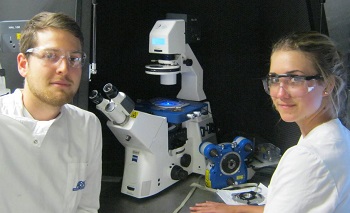JPK Instruments, a world-leading manufacturer of nanoanalytic instrumentation for research in life sciences and soft matter, reports on the use of AFM and the CellHesion® module to study plant cell wall biology in the School of Chemical Engineering at the University of Queensland.
 Users of the JPK NanoWizard® AFM & CellHesion module housed in the Queensland node of the Australian National Fabrication Facility (ANFF-Q). Pictured are PhD students, Mr Anton Pluschke and Miss Grace Dolan.
Users of the JPK NanoWizard® AFM & CellHesion module housed in the Queensland node of the Australian National Fabrication Facility (ANFF-Q). Pictured are PhD students, Mr Anton Pluschke and Miss Grace Dolan.
The Australian Research Council Centre of Excellence in Plant Cell Walls is a collaborative project involving the Universities of Adelaide, Melbourne and Queensland in partnership with South Australia State Government and seven international institutions. Their aim is to advance fundamental scientific understanding of plant cell wall biology. Cell wall composition determines the quality of most plant-based products used in modern human societies. The Centre's focus is on the nutritional and processing properties of plant-based foods which are heavily influenced by plant cell wall structure and composition. As the largest source of renewable carbon, plant cell walls have a critical future role in providing transport fuels, food security, functional foods (including dietary fibres) to improve human health and as raw materials for industrial processes.
Describing the work, Dr Gleb Yakubov from the Rheology & Biolubrication Laboratory in the School of Chemical Engineering at the University of Queensland says "Only relatively recently, we started to probe how mechanical stresses influence the growth and development of plant cells. These mechanical 'signals' provide an active feedback mechanism for cell biochemical machinery to know what goes on in its cellular neighbourhood as well as in the outside world. In particular we are interested in how mechanical properties change when cells grow and develop. We also seek to understand the role of micro- and nano-scale heterogeneities in the mechanical response of cell walls. Further, we are interested in how non-cellulose components such as hemicelluloses and pectins influence the wall assembly. Apart from fundamental insight, these components are the keys for human nutrition as they constitute the majority of dietary fibre within human diet."
Talking of why he chose to use JPK's AFM and CellHesion® module, Dr Yabukov continued: "CellHesion® is a useful tool when nano technique such as AFM is used to study microscopic objects. Plant cells are comparatively large, as large as 100 µm in our case, but could be even larger. For such experiments, it is of paramount importance to have a large range XYZ piezo-positioning system. Also, we use a PIFOC tool to enable synchronised AFM and CLSM measurements. We are fully utilising the power of combining AFM with other imaging techniques such as CLSM, SEM and TEM to ascertain complex properties of plant walls. The JPK NanoWizard® AFM provides an important functionality to allow the measurement of physical properties such as mechanical forces: adhesion, friction and surface forces."
For more details about JPK's NanoWizard® AFM and CellHesion® module and their applications for the bio & nano sciences, please contact JPK on +49 30533112070, visit the web site: www.jpk.com or see more on Facebook: www.jpk.com/facebook and on You Tube: https://www.youtube.com/jpkinstruments.